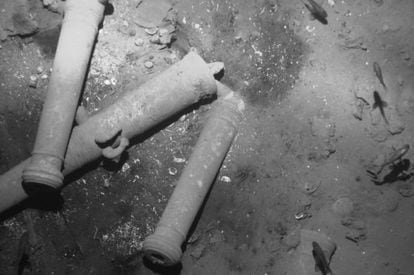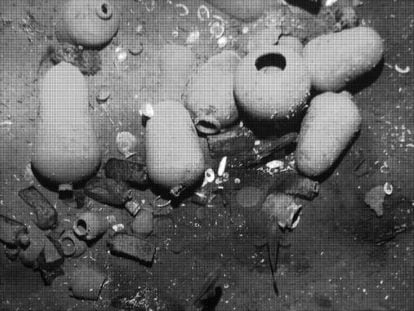Spain and Colombia engage in war of words over sunken galleon
President Santos maintains any treasure found on the ‘San José’ belongs to his people But the Spanish government will fight for its claim to state-owned vessel, says minister

The battle for the underwater treasure of the San José has just begun.
Colombian President Juan Manuel Santos insists that the trove from the shipwrecked Spanish galleon belongs to his country, while Spain refuses to give up its alleged rights over the ship.
There are a lot of owners who are now popping up. No sir, this is the Colombian people’s cultural heritage”
President Juan Manuel Santos
“The galleon is part of Colombia’s cultural heritage for the Colombian people,” Santos said on Tuesday, just one day after his government and Spanish officials agreed to try to negotiate an agreement over ownership.
“There are a lot of owners who are now popping up. No sir, this is the Colombian people’s cultural heritage,” the president added.
The San José was sunk by a British war fleet during the War of the Spanish Succession in 1708, in Caribbean waters near the coast of Cartagena de Indias, Colombia.
According to historical records, the Spanish galleon was carrying 200 tons of silver, gold and precious stones discovered in Peru, Ecuador and Colombia.
On Friday, Santos announced the find on Twitter. The following day at a news conference, he explained that a search team made up of government archeologists and researchers from a private organization found the wreckage on November 27, using an underwater unmanned vehicle.
The precise location of the wreck and other details about the discovery were not disclosed by Santos, who said the entire operation was a state secret.
Hallazgo del #GaleónSanJosé marca un hito histórico para nuestro patrimonio cultural sumergido.https://t.co/YjXxpvjfVz
— Juan Manuel Santos (@JuanManSantos) December 5, 2015
A tweet from Colombian President Juan Manuel Santos featuring a video of the expedition to locate the vessel. The text reads: “The discovery of the #GaleónSanJosé marks a historic milestone for our underwater cultural heritage.”
“Spain has a right to ownership,” said Spanish Culture Minister Íñigo Méndez de Vigo on Monday.
Foreign Minister José Manuel García-Margallo went further by issuing a warning to the government in Bogota. “If this cannot be resolved on friendly terms, they must understand that we will claim it and defend our rights.”
In response, President Santos defended his country’s position.
“We are going to share it with the rest of humanity because it is an important discovery, but its heritage belongs to the Colombian people,” he said.
If this cannot be resolved on friendly terms, they must understand that we will defend our rights” Foreign Minister García-Margallo
Spain has asked Colombia for information concerning the find and how it fits in with a UNESCO treaty, which establishes that such vessels belong to their country of origin.
“Spain has signed the UNESCO convention and everyone must comply with international law, even though Colombia hasn’t signed this treaty,” explained Méndez de Vigo, at the same time adding that the San José is a state-owned vessel.
Santos said that his government presented a cultural heritage protection law that was passed in 2013 so that the government “would have a legal basis, and all the measures at hand, to clear hurdles” in the event of such a controversy.
Foreign Ministry officials from both countries are expected to sit down to talks in the coming weeks. Plans for a meeting between García-Margallo and his Colombian counterpart, María Ángela Holguín, are also in the works.
Sea of litigation
The discovery of Spanish treasure in Colombian territorial waters is expected to open legal battles on all fronts and at different scales.
Antonio J. Rengifo Lozano, coordinator for the Center of Seas and Ocean Studies at the National University of Colombia, said that Colombia has two factors in its favor: the shipwreck is located in territorial waters and the discovery was made by the Colombian government.
This, of course, does not take into account that the treasure also came partly from Colombia, as well as Peru and Ecuador.
The story of the sinking of the San José during the War of the Spanish Succession and the trove that went down has always been shrouded in legend.
In 1982, a legal battle for ownership of the San José treasure began when the Glocca Morra Company sued the Colombian Maritime Directorate General (Dimar), claiming that it spotted the galleon first.
Two years later, the government of then-President Belisario Betancur announced that it was going to search for the shipwreck. By that time, Dimar had negotiated to split the treasure with Glocca Morra if it was eventually recovered.
The firm then signed over all rights to the US-based salvager Sea Search Armada (SSA), but the Betancur government issued a decree giving the private company a 5% finder’s fee and not 50% as Dimar had agreed with Glocca Morra.
SSA then sued the Colombian government.
After more than two decades of legal battles, the Colombia Supreme Court in 2007 agreed that SSA was entitled to 50% but only to the portions of the treasure that are not considered to have cultural heritage value.
In 2010, SSA sued Colombia in US District Court in the District of Columbia for compensation and full rights to the treasure, which was estimated to be worth $17 billion. But the court ruled in favor of Colombia and two years later a US appeals court reaffirmed that decision.
English version by Martin Delfín.











































